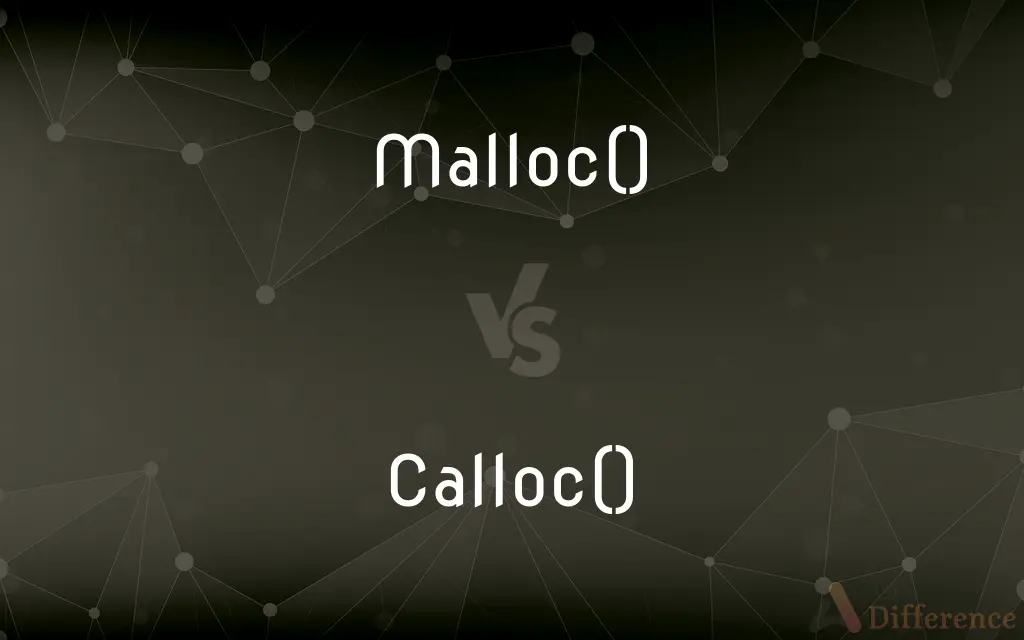Malloc() vs. Calloc() — What's the Difference?
By Tayyaba Rehman — Published on January 2, 2024
Malloc() allocates a block of memory without initializing it, while Calloc() allocates and initializes all bits to zero.

Difference Between Malloc() and Calloc()
Table of Contents
ADVERTISEMENT
Key Differences
Malloc(), short for memory allocation, is used in C programming to allocate a single block of memory on the heap of the specified size. The size is determined by the size parameter passed to Malloc(), and the space is not initialized, meaning it contains garbage values. Calloc(), or contiguous allocation, on the other hand, is used to allocate multiple blocks of memory and initializes all bytes to zero.
Both Malloc() and Calloc() are functions provided by the C standard library for dynamic memory allocation. While Malloc() takes a single argument defining the total size in bytes of the memory to be allocated, Calloc() requires two arguments: the number of elements and the size of each element. Calloc() is helpful when memory for arrays is allocated because it clears the allocated memory, avoiding any undefined behavior caused by garbage values.
When using Malloc(), one might often follow up with a memset call to initialize the allocated memory, which is an extra step that can be avoided if Calloc() is used instead. Calloc() may perform slightly slower than Malloc() because of the additional step of initializing the memory, which can have performance implications depending on the program's requirements.
While both functions return a void pointer to the allocated memory, which should be type-casted to the appropriate data type, Malloc() is typically used when speed is essential and the memory initialization is not necessary, or the program will immediately overwrite the allocated memory. Conversely, Calloc() is used when zero-initialized memory is required by the application, offering a bit more safety at the cost of performance.
Error handling is similar in both Malloc() and Calloc(); they both return a NULL pointer when the memory allocation fails. Regardless of which function is used, it is good practice to check the returned pointer before using the allocated memory to avoid undefined behavior, such as segmentation faults.
ADVERTISEMENT
Comparison Chart
Initialization
Does not initialize memory.
Initializes all bits to zero.
Number of Arguments
Requires one argument.
Requires two arguments.
Memory Allocation
Allocates a single block.
Allocates multiple blocks.
Use Case
When uninitialized memory is fine.
When zero-initialized memory is needed.
Performance
Generally faster.
Slightly slower due to initialization.
Compare with Definitions
Malloc()
The memory allocated by Malloc() contains indeterminate values.
Char *buffer = (char*)malloc(256);
Calloc()
Calloc() allocates memory and initializes it to zero.
Int *ptr = (int*)calloc(10, sizeof(int));
Malloc()
Malloc() allocates a specified number of bytes of memory.
Int *ptr = (int*)malloc(10 * sizeof(int));
Calloc()
Calloc() is ideal for allocating memory for arrays or structures when they need to be zero-initialized.
Struct point *pts = (struct point*)calloc(5, sizeof(struct point));
Malloc()
Malloc() is useful for dynamic memory allocation when exact memory size is known.
Float *array = (float*)malloc(n * sizeof(float));
Calloc()
Calloc() can be slightly slower than Malloc() due to the initialization step.
Uint *bitmask = (uint*)calloc(32, sizeof(uint)); if (!bitmask) { /* Handle allocation error */ }
Malloc()
If Malloc() fails, it returns a NULL pointer.
Void *memory = malloc(1024); if (!memory) { /* Handle allocation error */ }
Calloc()
The allocated memory by Calloc() helps prevent issues from uninitialized memory.
Char *str = (char*)calloc(100, sizeof(char));
Malloc()
Malloc() does not consider the size of the elements being stored.
Struct node *new_node = (struct node*)malloc(sizeof(struct node));
Calloc()
Calloc() takes two parameters, representing the number of elements and the size of each element.
Double *matrix = (double*)calloc(4, sizeof(double));
Malloc()
(computing) A subroutine in the C programming language's standard library for performing dynamic memory allocation.
Malloc()
(computing) To allocate memory using the C programming language malloc subroutine.
Common Curiosities
What should I do if Malloc() returns NULL?
Check for allocation failure and handle the error, possibly by freeing up memory or closing the program gracefully.
What does Malloc() do in C?
Malloc() dynamically allocates a single block of memory on the heap of a specified size.
What is the main purpose of Calloc()?
Calloc() allocates multiple blocks of memory and initializes them to zero.
How do Malloc() and Calloc() affect memory fragmentation?
Both can cause fragmentation, but proper allocation and deallocation can minimize it.
Is memory allocated by Calloc() automatically zero?
Yes, Calloc() initializes all allocated memory to zero.
How do I determine the size of memory to allocate with Malloc()?
Use the sizeof operator to calculate the size needed for Malloc().
How do you free memory allocated by Malloc() or Calloc()?
Use the free() function to deallocate memory.
Are Malloc() and Calloc() available in languages other than C?
They are primarily used in C and C++, but similar functions exist in other low-level languages.
Does Calloc() allocate memory contiguously?
Yes, Calloc() allocates contiguous memory blocks.
Can I use Malloc() for allocating an array?
Yes, but the memory will not be initialized.
If I need a block of memory of 256 integers, which one should I use?
If you need the memory to be zero-initialized, use Calloc(); otherwise, Malloc() is fine.
How can I initialize the memory allocated by Malloc()?
Use memset() after Malloc() to initialize the memory.
Can I reallocate memory allocated by Malloc() or Calloc()?
Yes, use realloc() to change the size of the allocated memory.
What's the difference in speed between Malloc() and Calloc()?
Malloc() is usually faster because it doesn't initialize the allocated memory.
Should I always prefer Calloc() over Malloc() for safety?
Not necessarily; use Calloc() when zero-initialization is required; otherwise, Malloc() is more efficient.
Share Your Discovery

Previous Comparison
Clustered Index vs. Non-Clustered Index
Next Comparison
Independence Day of India vs. Republic Day of IndiaAuthor Spotlight
Written by
Tayyaba RehmanTayyaba Rehman is a distinguished writer, currently serving as a primary contributor to askdifference.com. As a researcher in semantics and etymology, Tayyaba's passion for the complexity of languages and their distinctions has found a perfect home on the platform. Tayyaba delves into the intricacies of language, distinguishing between commonly confused words and phrases, thereby providing clarity for readers worldwide.














































